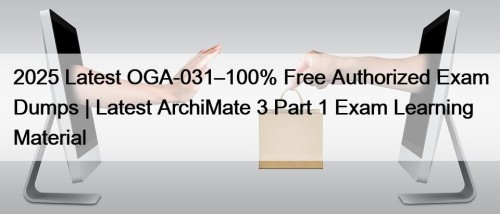Most Popular
 2025 Latest OGA-031–100% Free Authorized Exam Dumps | Latest ArchiMate 3 Part 1 Exam Learning Material
2025 Latest OGA-031–100% Free Authorized Exam Dumps | Latest ArchiMate 3 Part 1 Exam Learning Material
We have three versions packages of the OGA-031 exam questions ...
 2025 1Z0-931-25 Exam Questions | Efficient 1Z0-931-25: Oracle Autonomous Database Cloud 2025 Professional 100% Pass
2025 1Z0-931-25 Exam Questions | Efficient 1Z0-931-25: Oracle Autonomous Database Cloud 2025 Professional 100% Pass
Our 1Z0-931-25 exam materials are formally designed for the exam. ...
 Latest NCP-AIN Braindumps Free, NCP-AIN Latest Exam Materials
Latest NCP-AIN Braindumps Free, NCP-AIN Latest Exam Materials
The goal of NCP-AIN exam torrent is to help users ...



2025 1Z0-931-25 Exam Questions | Efficient 1Z0-931-25: Oracle Autonomous Database Cloud 2025 Professional 100% Pass

Our 1Z0-931-25 exam materials are formally designed for the exam. With its help, you don't have to worry about the exam any more for it almost guarantees you get what you want. If you think i'm exaggerating, you might as well take a look at our 1Z0-931-25 Actual Exam. With a high pass rate as 98% to 100%, you will be bound to pass the exam. And our 1Z0-931-25 training questions are popular in the market. We believe you will make the right choice.
Oracle 1Z0-931-25 Exam Syllabus Topics:
| Topic | Details |
|---|---|
| Topic 1 |
|
| Topic 2 |
|
| Topic 3 |
|
| Topic 4 |
|
>> 1Z0-931-25 Exam Questions <<
100% Pass Quiz Professional 1Z0-931-25 - Oracle Autonomous Database Cloud 2025 Professional Exam Questions
In the era of rapid changes in the knowledge economy, do you worry that you will be left behind? Let's start by passing the 1Z0-931-25 exam. Getting a 1Z0-931-25 certificate is something that many people dream about and it will also bring you extra knowledge and economic benefits. The 1Z0-931-25 latest question we provide all candidates that that is compiled by experts who have good knowledge of exam, and they are very experience in compile study materials. Not only that, our team checks the update every day, in order to keep the latest information of 1Z0-931-25 Exam Question.
Oracle Autonomous Database Cloud 2025 Professional Sample Questions (Q131-Q136):
NEW QUESTION # 131
You need to create a new database by using the Oracle Cloud Infrastructure (OCI) Command Line Interface (CLI) with the following requirements: Autonomous Transaction Processing, License Included, Shared Infrastructure. Which parameter would you NOT use?
- A. db-type
- B. db-workload
- C. license-model
- D. is-dedicated
Answer: A
Explanation:
Creating an Autonomous Transaction Processing (ATP) database via OCI CLI requires specific parameters:
Correct Answer (A): db-type is not a standard OCI CLI parameter for provisioning an Autonomous Database. The CLI uses parameters like db-workload to specify the type (e.g., ATP).
Used Parameters:
B: is-dedicated must be set to false for shared infrastructure.
C: db-workload is set to OLTP for ATP.
D: license-model is set to LICENSE_INCLUDED per the requirement.
The correct command might look like: oci db autonomous-database create --db-name <name> --db-workload OLTP --license-model LICENSE_INCLUDED --is-dedicated false.
NEW QUESTION # 132
A new Python developer has joined your team and needs to access the Autonomous Database dat a. How does the developer connect to and interact with the Autonomous Database from Python?
- A. By using SQL Developer
- B. By using Oracle Client and the cx_Oracle interface
- C. By using JDBC Driver
- D. By using Oracle Client and the DBD-oracle interface
Answer: B
Explanation:
Python developers connect to Autonomous Database using a dedicated library:
Correct Answer (D): "By using Oracle Client and the cx_Oracle interface" (now renamed oracledb) is the recommended method. The Oracle Client provides the underlying connectivity, and cx_Oracle (or oracledb) is a Python module for database access, supporting wallet-based authentication to Autonomous Database.
Incorrect Options:
A: SQL Developer is a GUI tool, not a Python interface.
B: DBD-oracle is not a standard Python library for Oracle; it's likely a typo or confusion with Perl's DBI.
C: JDBC is for Java, not Python; it's incompatible without a bridge like JPype.
This method ensures efficient, secure Python integration.
NEW QUESTION # 133
Which statement is FALSE about Autonomous Database maintenance on Dedicated Infrastructure?
- A. If a scheduled container database maintenance run cannot take place, Oracle automatically reschedules the container database maintenance for the following quarter.
- B. Autonomous Exadata Infrastructure maintenance runs are for infrastructure patching (including patching of the Exadata grid infrastructure code and operating systems updates) and includes container database patching.
- C. You can change your container database maintenance window or reschedule a single container database maintenance run to ensure that your container database maintenance runs follow.
- D. Autonomous Exadata Infrastructure maintenance takes place at least once each quarter.
Answer: B
Explanation:
Full Detailed In-Depth Explanation:
Maintenance on dedicated infrastructure:
A: True. You can adjust maintenance windows for container databases.
B: False. Exadata Infrastructure maintenance (e.g., OS, grid patching) is separate from container database patching, which occurs independently.
C: True. Oracle reschedules missed maintenance to the next quarter.
D: True. Infrastructure maintenance occurs quarterly.
NEW QUESTION # 134
When you are increasing the number of OCPUs in your Autonomous Database, what does its status show?
- A. RESIZING IN PROGRESS
- B. SCALING IN PROGRESS
- C. UPLIFT IN PROGRESS
- D. UPSCALE IN PROGRESS
Answer: B
Explanation:
Scaling OCPUs in an Autonomous Database triggers a specific status update. The correct answer is:
SCALING IN PROGRESS (D): When you increase (or decrease) the number of OCPUs, the database status in the OCI console changes to "SCALING IN PROGRESS." This indicates that the system is actively adjusting the compute resources, a process that typically completes in a few minutes with no downtime for active transactions.
The incorrect options are:
UPSCALE IN PROGRESS (A): "Upscale" is not an official status term used by Oracle for this operation.
RESIZING IN PROGRESS (B): While "resizing" might intuitively fit, Oracle specifically uses "SCALING IN PROGRESS" for CPU adjustments.
UPLIFT IN PROGRESS (C): "Uplift" is not a recognized status in the context of Autonomous Database scaling.
This status reflects Oracle's terminology for dynamic scaling.
NEW QUESTION # 135
Which Autonomous Database Service is NOT used to connect to an Autonomous Transaction Processing instance?
- A. LOW
- B. TPURGENT
- C. TPPERFORMANT
- D. MEDIUM
- E. HIGH
Answer: C
Explanation:
Full Detailed In-Depth Explanation:
Autonomous Transaction Processing (ATP) supports specific service names for connectivity:
TPURGENT: High-priority service with 200 concurrent statements per OCPU and parallelism.
MEDIUM: Balanced service for moderate workloads.
HIGH: Optimized for reporting/batch jobs with high parallelism.
LOW: Low-priority service for minimal resource use.
TP: General-purpose transactional service.
TPPERFORMANT is not a recognized service name in ATP documentation, making A the correct answer.
NEW QUESTION # 136
......
Are you ready to gain all these Oracle 1Z0-931-25 certification benefits? Looking for a simple, smart, and quick way to pass the challenging Oracle Autonomous Database Cloud 2025 Professional exam? If your answer is yes then you need to enroll in the 1Z0-931-25 exam and prepare well to crack this 1Z0-931-25 Exam with good scores. In this career advancement journey, you can get help from RealVCE. The RealVCE will provide you with real, updated, and error-free 1Z0-931-25 Exam Dumps that will enable you to pass the final Oracle Autonomous Database Cloud 2025 Professional exam easily.
1Z0-931-25 Valid Dumps Sheet: https://www.realvce.com/1Z0-931-25_free-dumps.html
- Practice 1Z0-931-25 Mock 🤾 Authorized 1Z0-931-25 Exam Dumps 🖖 1Z0-931-25 Latest Exam Papers 🍜 Download 【 1Z0-931-25 】 for free by simply entering ⇛ www.prep4sures.top ⇚ website 🌸1Z0-931-25 Relevant Answers
- 1Z0-931-25 Latest Exam Questions 🥶 Test 1Z0-931-25 Dump 📲 Simulation 1Z0-931-25 Questions 🍿 Simply search for ▷ 1Z0-931-25 ◁ for free download on ▶ www.pdfvce.com ◀ 🌞Simulation 1Z0-931-25 Questions
- Practical 1Z0-931-25 Exam Questions | Amazing Pass Rate For 1Z0-931-25: Oracle Autonomous Database Cloud 2025 Professional | Effective 1Z0-931-25 Valid Dumps Sheet 😟 Open website ( www.prep4pass.com ) and search for ✔ 1Z0-931-25 ️✔️ for free download ♥Latest 1Z0-931-25 Exam Registration
- 2025 Reliable 1Z0-931-25 Exam Questions | 100% Free 1Z0-931-25 Valid Dumps Sheet 🌠 ⮆ www.pdfvce.com ⮄ is best website to obtain ✔ 1Z0-931-25 ️✔️ for free download 🔫1Z0-931-25 Valid Vce Dumps
- 1Z0-931-25 Latest Dumps Pdf 🤛 Practice 1Z0-931-25 Mock 🤙 Certification 1Z0-931-25 Dumps 📩 Immediately open { www.getvalidtest.com } and search for ➠ 1Z0-931-25 🠰 to obtain a free download 🐸Latest 1Z0-931-25 Exam Registration
- 100% Pass Quiz 2025 Oracle Perfect 1Z0-931-25: Oracle Autonomous Database Cloud 2025 Professional Exam Questions 🐠 Copy URL 《 www.pdfvce.com 》 open and search for ✔ 1Z0-931-25 ️✔️ to download for free 🍿1Z0-931-25 Exam Assessment
- 100% Pass 2025 1Z0-931-25: Trustable Oracle Autonomous Database Cloud 2025 Professional Exam Questions 👞 Search for “ 1Z0-931-25 ” and download it for free on ▛ www.real4dumps.com ▟ website 📺1Z0-931-25 Certification Sample Questions
- Oracle 1Z0-931-25 Web-Based Practice Exam - Reliable Online Self-Assessment Test 🦓 Search for ➤ 1Z0-931-25 ⮘ and download exam materials for free through ⮆ www.pdfvce.com ⮄ 🤸1Z0-931-25 Exam Sample Questions
- 1Z0-931-25 Reliable Test Topics 🕖 1Z0-931-25 Exam Dumps Free 🙇 Certification 1Z0-931-25 Dumps 🤢 Search for “ 1Z0-931-25 ” and download exam materials for free through ⏩ www.prep4away.com ⏪ 📊1Z0-931-25 Exam Assessment
- Authorized 1Z0-931-25 Exam Dumps 💝 Latest 1Z0-931-25 Exam Registration 🍝 Authorized 1Z0-931-25 Exam Dumps 🥼 Go to website ⮆ www.pdfvce.com ⮄ open and search for ➠ 1Z0-931-25 🠰 to download for free 🔄1Z0-931-25 Exam Assessment
- Practice 1Z0-931-25 Mock 🐚 1Z0-931-25 Valid Vce Dumps 🐲 1Z0-931-25 Exam Dumps Free 🤏 Copy URL “ www.real4dumps.com ” open and search for 【 1Z0-931-25 】 to download for free 🔛1Z0-931-25 Valid Examcollection
- 1Z0-931-25 Exam Questions
- academia.ragif.com.ar learn.ywam.life graphyx.in palabrahcdi.com jimpete984.blogsvirals.com kopacskills.com iiconworld.com pulasthibandara.com tutor1.gerta.pl lifespaned.com
Tags: 1Z0-931-25 Exam Questions, 1Z0-931-25 Valid Dumps Sheet, Valid 1Z0-931-25 Exam Cram, 1Z0-931-25 Exams Dumps, 1Z0-931-25 Exam Vce